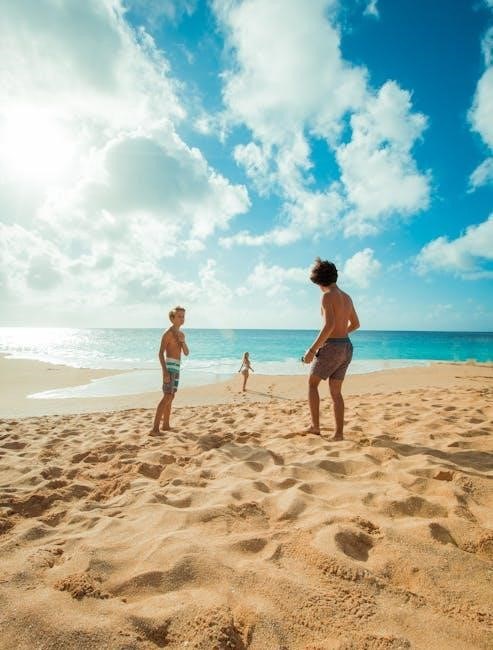The State of Hawaii Condo Guide offers a comprehensive overview of condo living, including ownership types, market trends, and essential resources for buyers and owners across the islands.
Welcome to the State of Hawaii Condo Guide, your ultimate resource for understanding condo living in paradise. From luxurious high-rises to charming townhomes, Hawaii offers diverse condo options tailored to various lifestyles. Condo living here provides unmatched amenities, stunning views, and a strong sense of community. However, it also comes with unique considerations, such as HOA fees, shared spaces, and island-specific challenges like parking and maintenance. This guide will help you navigate the ins and outs of condo ownership, ensuring you make informed decisions about your Hawaiian home.
Understanding Hawaii Condo Ownership
Owning a condo in Hawaii involves shared ownership within a community. Each unit is individually owned, while common areas like pools, gyms, and landscaping are jointly maintained. This shared responsibility is managed by a Homeowners Association (HOA), which oversees rules, fees, and maintenance. Owners must adhere to bylaws and contribute financially through monthly fees. Understanding these dynamics is crucial for a harmonious living experience. The legal framework ensures that all owners have equal rights and responsibilities, fostering a balanced community environment in Hawaii’s unique condo landscape.
Types of Condos in Hawaii
Hawaii offers diverse condo options, catering to various lifestyles and budgets. Luxury high-rise condos in urban areas like Honolulu feature modern amenities and ocean views. Townhomes and low-rise complexes provide a more intimate setting, often in resort areas. Affordable housing projects are available for residents, while cond-hotels blend residential and vacation rental uses. Each type varies in size, location, and amenities, ensuring a wide range of choices for buyers seeking island living. From entry-level units to luxury properties, Hawaii’s condo market has something for everyone, reflecting the state’s unique real estate landscape.

Hawaii Condo Market Overview
Hawaii’s condo market is thriving in 2023, with new developments offering affordable to luxury options, catering to diverse buyer preferences and investment goals.
Current Market Trends in 2023
In 2023, Hawaii’s condo market reflects a dynamic landscape with new developments catering to diverse buyer needs, from affordable housing to luxury properties. The average condo price in Honolulu was $500,000, slightly down from 2022. Rising insurance costs, driven by global catastrophic events, pose challenges for owners. State programs aim to alleviate these pressures, offering relief for condo insurance premiums. Buyers are drawn to properties with modern amenities, such as EV-ready buildings, while sellers benefit from sustained demand. This year, the market balances affordability and luxury, attracting both residents and investors.
Recent Developments in Hawaii Condo Market
Hawaii’s condo market has seen notable developments in 2023, with a surge in new construction projects. These range from affordable housing initiatives to ultra-luxury complexes, offering diverse options for buyers. Key areas like Kakaako and Ward Village feature high-profile launches, such as Victoria Place and Koula, which emphasize modern living and amenities. Additionally, there’s a focus on sustainability and eco-friendly features, aligning with Hawaii’s environmental goals. These developments not only enhance the islands’ real estate landscape but also address the growing demand for housing in both urban and resort areas, ensuring a vibrant market for years to come.
Popular Condo Locations Across the Islands
Popular condo locations in Hawaii include Waikiki, Kakaako, and Kihei, known for their vibrant amenities and stunning ocean views. Oahu’s urban centers, like Honolulu, offer luxury high-rises, while Maui’s Kihei and Kaanapali provide beachfront living. Kauai’s Poipu and Princeville are favorites for resort-style condos, and the Big Island’s Waikoloa and Hilo offer diverse options. These locations attract both residents and investors, blending island lifestyle with modern convenience, making them highly sought after in Hawaii’s competitive condo market.
Cost of Owning a Condo in Hawaii
Owning a condo in Hawaii involves average prices around $500,000, with additional costs for parking, maintenance, and taxes, reflecting the state’s high living expenses.
Average Condo Prices in Honolulu
In Honolulu, the average condo price is around $500,000, reflecting a 2% decrease from 2022. Prices range from $400,000 for smaller units to over $1 million for luxury properties. Factors like location, size, and amenities significantly influence costs. Condos in prime areas, such as Waikiki or Kakaako, often command higher prices due to proximity to beaches, views, and amenities; The market remains competitive, with demand for condo living staying strong despite slight price fluctuations. Buyers should research current listings and consult real estate experts to navigate the dynamic market effectively.
HOA Fees and What They Cover
Homeowners Association (HOA) fees in Hawaii condos cover shared expenses like building maintenance, common area upkeep, and amenities such as pools or gyms. These fees vary by property, depending on the condo’s size, amenities, and location. On average, HOA fees range from $300 to $1,000 per month. They also typically include insurance for common areas and property management costs. However, utilities and property taxes remain the owner’s responsibility. Understanding HOA fees is crucial for budgeting, as they significantly impact the overall cost of condo ownership in Hawaii.
Additional Costs: Parking, Maintenance, and Taxes
Beyond HOA fees, condo owners in Hawaii face additional expenses. Parking can cost $50 to $100 monthly, especially in urban areas like Honolulu. Maintenance costs may include special assessments for repairs or upgrades. Property taxes are typically lower for condos compared to single-family homes but vary by island and property value. Tax rates range from 0.3% to 1.2% of the condo’s value annually. These costs, while necessary, add to the overall financial commitment of condo ownership in Hawaii, making budgeting essential for prospective buyers and current owners alike.

Insurance and Liability
Insurance costs for Hawaii condos are rising due to climate risks, with state programs offering relief. Liability coverage is crucial for protecting condo associations and owners from unforeseen damages.
Rising Insurance Costs for Condos in Hawaii
Insurance costs for Hawaii condos have increased significantly due to climate-related risks and global reinsurance expenses. In 2023, rising premiums were driven by catastrophic events, including wildfires and storms. State programs aim to provide relief, but owners face higher expenses. Many condo associations now struggle with elevated insurance rates, impacting affordability and resale value. This trend highlights the growing financial challenges for condo owners in Hawaii’s volatile market.
State Programs for Affordable Insurance
Hawaii has implemented state programs to address rising insurance costs for condos. In 2023, Governor Josh Green utilized emergency powers to assist state insurance carriers in offering policies to condo projects. These initiatives aim to stabilize premiums and provide relief to condo owners facing high costs. Additionally, the state legislature introduced measures to support condo associations, helping them secure affordable coverage. These programs reflect Hawaii’s commitment to mitigating the financial burden of insurance on condo owners and ensuring the sustainability of condo living in the islands.
Climate-Related Risks and Insurance Implications
Climate change has significantly impacted condo insurance in Hawaii, with rising premiums due to increased catastrophic risks. In 2023, the state experienced 23 climate-related incidents, driving up reinsurance costs. This has led to higher insurance premiums for condo owners. Governor Josh Green invoked emergency powers to assist state insurance carriers in offering policies to condo projects, addressing the crisis. These measures aim to mitigate financial burdens on condo owners while ensuring properties remain protected against climate-related threats, which are becoming more frequent and severe in Hawaii.

Buying a Condo in Hawaii
The State of Hawaii Condo Guide provides a comprehensive overview of the condo buying process, highlighting key considerations and essential steps to ensure a smooth purchase experience.
Steps to Purchase a Condo
Purchasing a condo in Hawaii involves several key steps. Start by identifying the right project, considering factors like location, size, and amenities. Next, review and understand the deposit schedule and payment terms. After signing the contract, you have a right to cancel within a specified period. Conduct thorough due diligence, including reviewing condo documents and financial statements. Secure financing through pre-approval or alternative options. Finally, close the deal by completing all legal and financial requirements. This structured approach ensures a smooth and informed buying experience in Hawaii’s condo market.
Key Considerations Before Buying
Before purchasing a condo in Hawaii, consider location, budget, and amenities. Evaluate the condo’s history, including maintenance issues and insurance costs, which have risen due to climate risks. Review HOA fees and what they cover, as these can impact long-term affordability. Assess parking availability and additional costs like taxes. Research the condo’s governance and financial health to avoid future surprises. Work with a real estate agent familiar with Hawaii’s market and consult a real estate attorney to navigate legal complexities. Ensuring all these factors align with your needs is crucial for a successful purchase.
Financing Options for Condo Purchases
Financing a condo in Hawaii can be achieved through various methods, including conventional loans, FHA loans, and VA loans for eligible buyers. Local banks and credit unions offer tailored options, while state programs provide incentives for first-time buyers. Average condo prices in Honolulu, around $500,000, often require substantial down payments and competitive interest rates. Buyers should also consider rising insurance costs and factor them into their budget. Consulting with a financial advisor or mortgage broker familiar with Hawaii’s market is essential to navigate these options effectively and secure the best terms for your condo purchase.
Renting a Condo in Hawaii
Renting a condo in Hawaii offers a convenient and flexible housing option, with various locations and amenities available across the islands, catering to diverse lifestyles and preferences.
Responsibilities of Tenants and Landlords
Tenants are expected to pay rent on time, comply with condo rules, and maintain the unit. Landlords must provide quiet enjoyment, ensure safety, and address maintenance issues promptly. Tenants should report damages or needed repairs to avoid liability, while landlords must disclose known defects and adhere to fair housing laws. Both parties must respect condominium association regulations and communicate openly to resolve disputes. Understanding these responsibilities helps foster a positive rental experience in Hawaii’s competitive condo market.
Clear agreements and compliance with local laws are essential for a harmonious relationship.
Popular Rental Condo Locations
Popular rental condo locations in Hawaii include Waikiki for its vibrant beaches and nightlife, Kihei on Maui for affordable options, and Ko Olina for luxury resort living. Kakaako and Ala Moana in Honolulu are sought after for urban convenience and amenities. Kahului on Maui offers a mix of affordability and accessibility, while Princeville on Kauai provides scenic luxury. These areas attract renters with their unique blend of amenities, location, and lifestyle, catering to diverse preferences and budgets across the islands. Each location offers a distinct experience, making Hawaii a prime destination for condo renters.
Negotiating a Rental Agreement
Negotiating a rental agreement in Hawaii requires understanding lease terms, security deposits, and tenant responsibilities. Clarify rent, duration, and renewal options upfront. Ensure amenities like parking or pool access are included. Landlords must provide a written agreement outlining rules and fees. Tenants should review condo association policies and request repairs in writing. Negotiate pet policies if applicable. Document everything to avoid disputes. Understanding responsibilities and terms ensures a smooth rental experience for both parties. Clear communication is key to a fair and mutually beneficial agreement. Always seek legal advice if unsure about any clause or condition. Renters should also inquire about any additional fees upfront.

Selling a Condo in Hawaii
Selling a condo in Hawaii involves understanding market trends, with average prices around $500,000 in 2023. Consider HOA fees, parking, and buyer preferences for a smooth transaction.
Best Practices for Selling Your Condo
To sell your condo effectively in Hawaii, research current market trends and price competitively. Highlight unique features like ocean views or proximity to beaches. Ensure your unit is well-staged and showcased with high-quality photos. Disclose all fees, maintenance issues, and HOA details upfront to build trust. Consider hiring a real estate agent familiar with Hawaii’s condo market. Be prepared for negotiations and flexible with showing schedules. Address any deferred maintenance to attract serious buyers. Stay informed about local regulations and tax implications to streamline the process.
Current Market Conditions for Sellers
Hawaii’s condo market remains competitive, with steady demand in popular areas like Honolulu. In 2023, average condo prices in Honolulu were around $500,000, slightly down from 2022. Sellers should leverage market insights to price units accurately, considering factors like location, amenities, and maintenance costs. High demand for oceanfront and luxury properties continues, while affordable options attract first-time buyers. Staging and highlighting unique features can maximize appeal. With rising insurance costs and HOA fees, transparency is key to attracting serious buyers. Stay updated on trends and regulations to navigate the market effectively.
Legal and Financial Considerations
Understanding the legal and financial aspects of condo ownership in Hawaii is crucial. Rising insurance costs, driven by climate risks, impact condo affordability. State programs aim to provide relief for high premiums. HOA fees vary widely, covering maintenance, amenities, and shared services. Buyers must review condo documents, including CC&Rs, to understand rules and financial obligations. Additional costs like parking, property taxes, and special assessments should be factored in. Consulting legal and financial experts ensures compliance with regulations and helps navigate complex investment decisions in Hawaii’s dynamic condo market.
Tax Implications and Investment
Condo ownership in Hawaii offers tax benefits like property tax deductions and potential rental income opportunities, making condos attractive for both personal use and investment strategies.
Tax Benefits of Condo Ownership
Owning a condo in Hawaii offers several tax benefits, including deductions for property taxes and mortgage interest. These deductions can significantly reduce annual tax liabilities. Additionally, condo owners may benefit from tax advantages related to rental income if they choose to rent out their property. However, it’s important to consult with a tax professional to understand specific deductions and credits applicable to your situation, as tax laws and regulations can change. Proper documentation and understanding of local and state tax policies are crucial to maximizing these benefits and ensuring compliance with all legal requirements.
Condos as Investment Properties
Condos in Hawaii can be a lucrative investment due to high demand for vacation rentals and rising property values. Key locations like Honolulu, Maui, and Kihei offer strong rental income potential. With an average condo price of $500,000 in Honolulu in 2023, investors can capitalize on both long-term appreciation and short-term rental income. Popular areas like Wailea and Kihei attract tourists, making condos ideal for vacation rentals. Sustainability features and amenities like pools or ocean views further enhance investment appeal. However, factors like HOA fees and property taxes should be considered. Consulting with real estate professionals can help optimize investment returns and ensure compliance with local regulations.
Short-Term Rentals and Tax Implications
Short-term rentals in Hawaii condos offer lucrative income opportunities but come with specific tax obligations. Rental income is taxable, requiring owners to report it on their tax returns. Expenses like property taxes, HOA fees, and maintenance can be deducted, reducing taxable income. However, increased insurance costs due to climate risks may impact profitability. State programs, such as those introduced in 2023 to address rising premiums, can help mitigate financial burdens. Consulting a tax professional is essential to navigate these complexities and ensure compliance with Hawaii’s unique tax regulations for short-term rental properties.
Resources for Condo Owners and Buyers
Online guides like HIcondos.com and Hawaii Condo Living Guide provide detailed condo listings, market insights, and legal tips. Access condo documents and expert advice for informed decisions.
Online Guides and Databases
Online platforms like HIcondos.com and Hawaii Condo Living Guide provide detailed condo listings, market reports, and tools for buyers. These databases offer insights into affordability, luxury options, and new developments through 2023. They feature condo documents, legal tips, and YouTube guides to aid decision-making. Buyers can explore properties by location, size, and floor plans. These resources help buyers and owners stay informed about market trends and legal requirements, ensuring they make well-informed decisions when purchasing or managing a condo in Hawaii.
Legal and Financial Advisors
Legal and financial advisors play a crucial role in navigating Hawaii’s condo market. Attorneys specialize in condo laws, ensuring compliance with regulations and reviewing contracts. Financial experts help buyers understand mortgages, taxes, and HOA fees. They provide personalized advice to maximize investments and avoid pitfalls. With their expertise, clients can make informed decisions tailored to their needs, ensuring a smooth transaction and long-term financial stability in Hawaii’s dynamic condo market. Their guidance is essential for both buyers and sellers to achieve successful outcomes in their real estate endeavors.
Community and Association Support
Community and association support are vital for condo owners in Hawaii. Many condos have active boards that manage shared spaces, organize events, and enforce rules to maintain property value. Associations often provide resources like legal and financial guidance to help owners navigate challenges; Additionally, community support groups offer networking opportunities and advice on local services. Some complexes also feature amenities like beach access, fitness centers, and golf courses, enhancing the living experience. These support systems ensure a harmonious and well-maintained environment for residents, fostering a sense of community and shared responsibility.
Future of Hawaii Condo Market
The Hawaii condo market is expected to evolve with sustainable designs, smart technology, and new developments, offering modern living solutions while preserving the islands’ unique charm.
Upcoming Developments and Trends
Hawaii’s condo market is poised for growth with new developments focusing on sustainability and luxury. Projects like Victoria Place and Koula offer modern amenities, while EV-ready buildings and renewable energy integration are becoming priorities. The trend towards eco-friendly condos aligns with Hawaii’s environmental goals. Additionally, there is an increase in mixed-use developments, combining residential, retail, and commercial spaces, enhancing community living. These advancements cater to both locals and investors, ensuring Hawaii remains a desirable location for condo ownership and investment.
Sustainability and Eco-Friendly Condos
Hawaii’s condo market is embracing sustainability, with developments incorporating solar panels, energy-efficient appliances, and rainwater harvesting systems. Eco-friendly condos are gaining popularity, offering residents reduced utility costs and a smaller carbon footprint. Builders are prioritizing green certifications, such as LEED, to meet growing demand for environmentally responsible housing. These initiatives align with Hawaii’s renewable energy goals, making eco-conscious condos a key trend in the islands’ real estate market, attracting both local buyers and eco-minded investors seeking sustainable living options in paradise.
Technological Advancements in Condo Living
Hawaii’s condo market is integrating cutting-edge technology to enhance living experiences. Smart home devices, such as voice-controlled thermostats and lighting, are becoming standard. High-rise condos now feature advanced security systems, including keyless entry and biometric scanners. Energy management systems optimize utility use, while high-speed internet and fiber-optic connectivity ensure seamless communication. Virtual reality platforms allow potential buyers to tour properties remotely; Additionally, mobile apps streamline condo management, enabling residents to book amenities, pay fees, and access services. These innovations are redefining modern condo living in Hawaii, blending convenience, safety, and efficiency.

